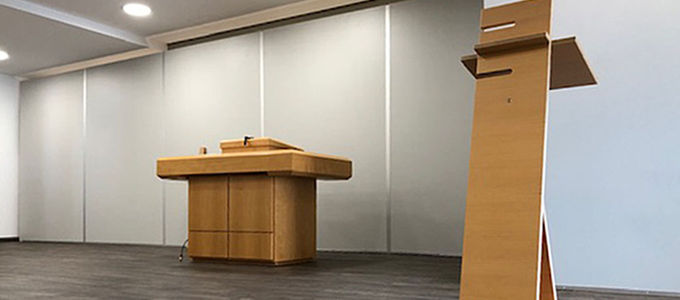
Normally, 60,000 New Apostolic congregations come together for divine service on Sundays—but that was before the Corona crisis. Over the past few weeks, this offer has been reduced to two dozen central video services across the globe. On Easter there will only be one divine service: with the Chief Apostle.
We can no longer go to church, but we can still come together: #prayhome is the motto. And this includes divine services. Christians hear God’s word on YouTube or by telephone, they pray and sing together. On Sunday, for the first time ever, Chief Apostle Jean-Luc Schneider will conduct an Easter service, which believers can participate in over the Internet and the telephone.
United States celebrates 40 years of divine service broadcasts
The congregations in the United States are celebrating a small anniversary. In 1980, exactly 40 years ago—also on Easter—the first video transmission of a divine service took place. Chief Apostle Hans Urwyler was in New York at the time, conducting a service for the American congregations. Four decades later, Chief Apostle Schneider’s sermon can be received throughout the entire New Apostolic world.
The list of technical requirements is long, but the preparations are almost complete. How will the signal from the premises of Bischoff Publishers reach every home? The Internet makes it possible. The impressive list of links has been published variously. All the participants have to do is open the link they have been using the previous Sundays. They can then follow the divine service on a laptop, a tablet, a smartphone, a smart TV. Participants can also connect via telephone dial-up.
One altar, hundreds of thousands of believers
“The divine service studio has been built, the altar has been set up. The final preparations are now complete. The entrance foyer of the Bischoff publishers in Neu-Isenburg has been transformed into a small chapel. Everything necessary for a divine service has now been installed: an altar, a piano, and an organ. And the camera positions and microphones have also been coordinated for the online transmission of the service,” it says on nak.org.
As with other online divine services, there will be no celebration of Holy Communion this time either. In his interview the Chief Apostle said: “I know that many members will have to do without Holy Communion until the end of this pandemic. I share their suffering, since I am, after all, likewise confined to my home until further notice as a result of the lockdown. However, particularly in these times of distress, let us trust in God. Let us put our trust in God—He always knows how to give those who love Him that which is indispensable for their salvation!”
Language diversity without Babylonian confusion
Chief Apostle Jean-Luc Schneider will conduct the divine service in the German language. His sermon will interpreted into a number of languages. There will be interpreters at the publishing house who will render the sermon into English, French, Portuguese, and Spanish, as well as in German Sign Language. Numerous additional local interpretations will be added by the individual District Apostle Areas as needed.
There is something else that is different to the services we usually have in our own congregation: the hymns have already been determined. As opening hymn everyone will sing the well-known Easter hymn: “Sing, all you Christians, glad hymns now be voicing ! Praise bring the Lord who has died us to save! Sing till the echoes ring out with rejoicing; Jesus, arisen, has conquered the grave Jesus, arisen, has conquered the grave.” Because of the international congregation, hymns will be sung that are known in all New Apostolic congregations. Three more hymns will be sung during the divine service: “What a friend we have in Jesus”, “Come in, O Lord, come in”, and “Dear brothers and dear sisters”.




